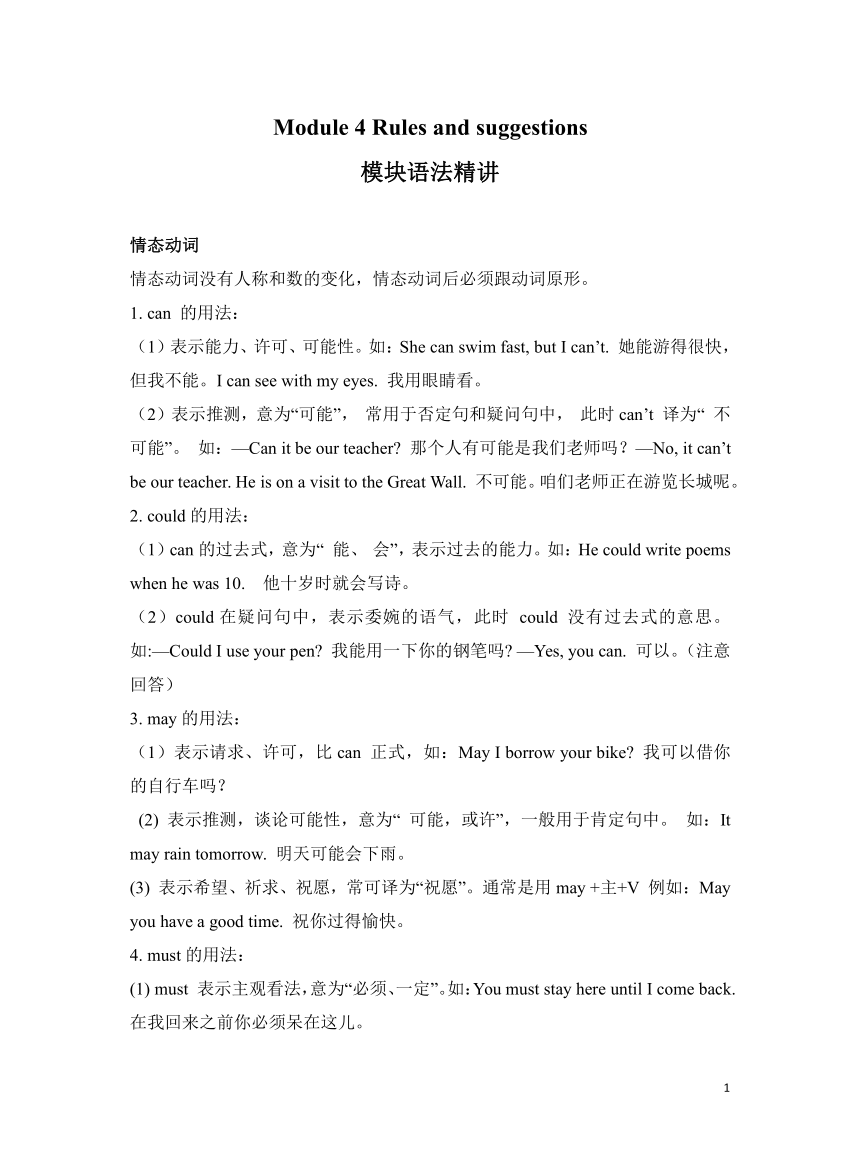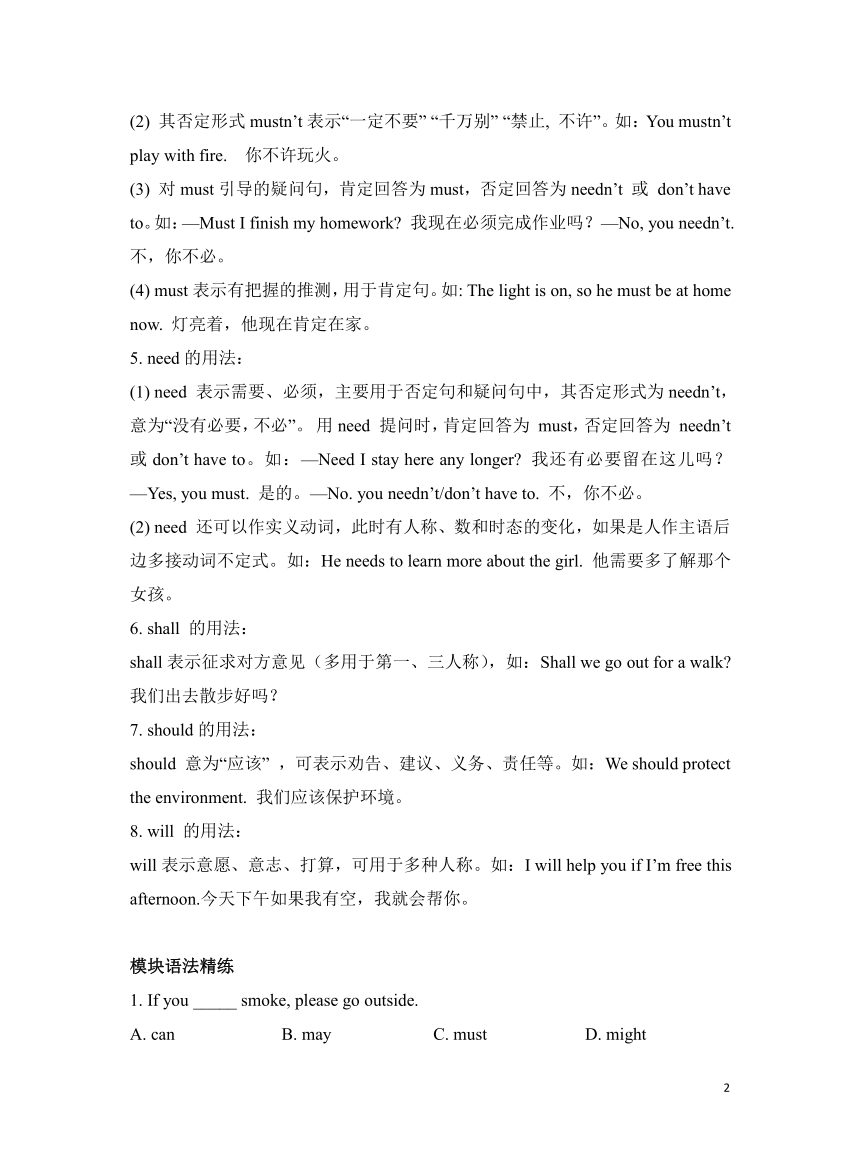外研版英语九年级下册 Module 4 Rules and suggestions 模块语法精讲
文档属性
| 名称 | 外研版英语九年级下册 Module 4 Rules and suggestions 模块语法精讲 |

|
|
| 格式 | docx | ||
| 文件大小 | 15.9KB | ||
| 资源类型 | 教案 | ||
| 版本资源 | 外研版 | ||
| 科目 | 英语 | ||
| 更新时间 | 2024-02-21 00:00:00 | ||
图片预览


文档简介
Module 4 Rules and suggestions
模块语法精讲
情态动词
情态动词没有人称和数的变化,情态动词后必须跟动词原形。
1. can 的用法:
(1)表示能力、许可、可能性。如:She can swim fast, but I can’t. 她能游得很快,但我不能。I can see with my eyes. 我用眼睛看。
(2)表示推测,意为“可能”, 常用于否定句和疑问句中, 此时can’t 译为“ 不可能”。 如:—Can it be our teacher 那个人有可能是我们老师吗?—No, it can’t be our teacher. He is on a visit to the Great Wall. 不可能。咱们老师正在游览长城呢。
2. could的用法:
(1)can的过去式,意为“ 能、 会”,表示过去的能力。如:He could write poems when he was 10. 他十岁时就会写诗。
(2)could在疑问句中,表示委婉的语气,此时 could 没有过去式的意思。如:—Could I use your pen 我能用一下你的钢笔吗 —Yes, you can. 可以。(注意回答)
3. may的用法:
(1)表示请求、许可,比can 正式,如:May I borrow your bike 我可以借你的自行车吗?
(2) 表示推测,谈论可能性,意为“ 可能,或许”,一般用于肯定句中。 如:It may rain tomorrow. 明天可能会下雨。
(3) 表示希望、祈求、祝愿,常可译为“祝愿”。通常是用may +主+V 例如:May you have a good time. 祝你过得愉快。
4. must的用法:
(1) must 表示主观看法,意为“必须、一定”。如:You must stay here until I come back. 在我回来之前你必须呆在这儿。
(2) 其否定形式mustn’t表示“一定不要” “千万别” “禁止, 不许”。如:You mustn’t play with fire. 你不许玩火。
(3) 对must引导的疑问句,肯定回答为must,否定回答为needn’t 或 don’t have to。如:—Must I finish my homework 我现在必须完成作业吗?—No, you needn’t.不,你不必。
(4) must表示有把握的推测,用于肯定句。如: The light is on, so he must be at home now. 灯亮着,他现在肯定在家。
5. need的用法:
(1) need 表示需要、必须,主要用于否定句和疑问句中,其否定形式为needn’t,意为“没有必要,不必”。 用need 提问时,肯定回答为 must,否定回答为 needn’t或don’t have to。如:—Need I stay here any longer 我还有必要留在这儿吗?—Yes, you must. 是的。—No. you needn’t/don’t have to. 不,你不必。
(2) need 还可以作实义动词,此时有人称、数和时态的变化,如果是人作主语后边多接动词不定式。如:He needs to learn more about the girl. 他需要多了解那个女孩。
6. shall 的用法:
shall表示征求对方意见(多用于第一、三人称),如:Shall we go out for a walk 我们出去散步好吗?
7. should的用法:
should 意为“应该” ,可表示劝告、建议、义务、责任等。如:We should protect the environment. 我们应该保护环境。
8. will 的用法:
will表示意愿、意志、打算,可用于多种人称。如:I will help you if I’m free this afternoon.今天下午如果我有空,我就会帮你。
模块语法精练
1. If you _____ smoke, please go outside.
A. can B. may C. must D. might
2. Children _______ sit in the front seat of a car. It’s too dangerous.
A. need B. needn’t
C. must D. mustn’t
3. —Is the long-haired man Bruce
—No, it _______ be him. He’s in New York now.
A. can’t B. mustn’t
C. needn’t D. may not
4. —Bob, where is Linda
—She _______ be in the library, but I am not sure.
A. must B. may
C. need D. has to
5. We ______ pay to get into the concert. It’s free.
A. can’t B. mustn’t
C. might not D. don’t have to
6. It looks like rain, so you _______ bring your umbrella with you.
A. should B. must C. can D. can’t
7. — How will the weather be tomorrow
—It ______ be rainy or sunny. Who knows
A. must B. might C. shall D. should
答案
1. C【解析】can能 会;may可以;must必须;might可能。根据句意“如果你抽烟,请到外面去”,结合几个情态动词的基本意思可知选C。
2. D【解析】根据后面too dangerous太危险当然是不准坐前面,是一个命令的祈使,B是不必相当于don’t have to。
3. A【解析】根据答语:他现在在纽约,可知这个人不肯能是Bruce,故选A。
4. B【解析】根据答语:但是我不能确定,可知她在图书馆只是一种可能性,故选B,表示一种推测。
5. D【解析】句意:我们没必要付去听音乐会的费用,它是免费的。can’t不能;mustn’t禁止;might not不可能;don’t have to没必要。根据句意选D。
6. A【解析】题意为“看起来会下雨,所以你应该需要带雨伞。”,should意为“应该”;must意为“必须”;can意为“能够”,由题意及解析可知答案为A。
7. B【解析】上句问:明天的天气怎么样?下句答语中有or连接两种可能,尤其是最后的“谁知道呢?”因此两者都有可能,可能性最小的答案是最正确的。
1
模块语法精讲
情态动词
情态动词没有人称和数的变化,情态动词后必须跟动词原形。
1. can 的用法:
(1)表示能力、许可、可能性。如:She can swim fast, but I can’t. 她能游得很快,但我不能。I can see with my eyes. 我用眼睛看。
(2)表示推测,意为“可能”, 常用于否定句和疑问句中, 此时can’t 译为“ 不可能”。 如:—Can it be our teacher 那个人有可能是我们老师吗?—No, it can’t be our teacher. He is on a visit to the Great Wall. 不可能。咱们老师正在游览长城呢。
2. could的用法:
(1)can的过去式,意为“ 能、 会”,表示过去的能力。如:He could write poems when he was 10. 他十岁时就会写诗。
(2)could在疑问句中,表示委婉的语气,此时 could 没有过去式的意思。如:—Could I use your pen 我能用一下你的钢笔吗 —Yes, you can. 可以。(注意回答)
3. may的用法:
(1)表示请求、许可,比can 正式,如:May I borrow your bike 我可以借你的自行车吗?
(2) 表示推测,谈论可能性,意为“ 可能,或许”,一般用于肯定句中。 如:It may rain tomorrow. 明天可能会下雨。
(3) 表示希望、祈求、祝愿,常可译为“祝愿”。通常是用may +主+V 例如:May you have a good time. 祝你过得愉快。
4. must的用法:
(1) must 表示主观看法,意为“必须、一定”。如:You must stay here until I come back. 在我回来之前你必须呆在这儿。
(2) 其否定形式mustn’t表示“一定不要” “千万别” “禁止, 不许”。如:You mustn’t play with fire. 你不许玩火。
(3) 对must引导的疑问句,肯定回答为must,否定回答为needn’t 或 don’t have to。如:—Must I finish my homework 我现在必须完成作业吗?—No, you needn’t.不,你不必。
(4) must表示有把握的推测,用于肯定句。如: The light is on, so he must be at home now. 灯亮着,他现在肯定在家。
5. need的用法:
(1) need 表示需要、必须,主要用于否定句和疑问句中,其否定形式为needn’t,意为“没有必要,不必”。 用need 提问时,肯定回答为 must,否定回答为 needn’t或don’t have to。如:—Need I stay here any longer 我还有必要留在这儿吗?—Yes, you must. 是的。—No. you needn’t/don’t have to. 不,你不必。
(2) need 还可以作实义动词,此时有人称、数和时态的变化,如果是人作主语后边多接动词不定式。如:He needs to learn more about the girl. 他需要多了解那个女孩。
6. shall 的用法:
shall表示征求对方意见(多用于第一、三人称),如:Shall we go out for a walk 我们出去散步好吗?
7. should的用法:
should 意为“应该” ,可表示劝告、建议、义务、责任等。如:We should protect the environment. 我们应该保护环境。
8. will 的用法:
will表示意愿、意志、打算,可用于多种人称。如:I will help you if I’m free this afternoon.今天下午如果我有空,我就会帮你。
模块语法精练
1. If you _____ smoke, please go outside.
A. can B. may C. must D. might
2. Children _______ sit in the front seat of a car. It’s too dangerous.
A. need B. needn’t
C. must D. mustn’t
3. —Is the long-haired man Bruce
—No, it _______ be him. He’s in New York now.
A. can’t B. mustn’t
C. needn’t D. may not
4. —Bob, where is Linda
—She _______ be in the library, but I am not sure.
A. must B. may
C. need D. has to
5. We ______ pay to get into the concert. It’s free.
A. can’t B. mustn’t
C. might not D. don’t have to
6. It looks like rain, so you _______ bring your umbrella with you.
A. should B. must C. can D. can’t
7. — How will the weather be tomorrow
—It ______ be rainy or sunny. Who knows
A. must B. might C. shall D. should
答案
1. C【解析】can能 会;may可以;must必须;might可能。根据句意“如果你抽烟,请到外面去”,结合几个情态动词的基本意思可知选C。
2. D【解析】根据后面too dangerous太危险当然是不准坐前面,是一个命令的祈使,B是不必相当于don’t have to。
3. A【解析】根据答语:他现在在纽约,可知这个人不肯能是Bruce,故选A。
4. B【解析】根据答语:但是我不能确定,可知她在图书馆只是一种可能性,故选B,表示一种推测。
5. D【解析】句意:我们没必要付去听音乐会的费用,它是免费的。can’t不能;mustn’t禁止;might not不可能;don’t have to没必要。根据句意选D。
6. A【解析】题意为“看起来会下雨,所以你应该需要带雨伞。”,should意为“应该”;must意为“必须”;can意为“能够”,由题意及解析可知答案为A。
7. B【解析】上句问:明天的天气怎么样?下句答语中有or连接两种可能,尤其是最后的“谁知道呢?”因此两者都有可能,可能性最小的答案是最正确的。
1
同课章节目录
- Module 1 Travel
- Unit 1 We toured the city by bus and by taxi
- Unit 2 It's a long story.
- Unit 3 Language in use
- Module 2 Education
- Unit 1 They don't sit in rows.
- Unit 2 What do I like best about school?
- Unit 3 Language in use
- Module 3 Life now and then
- Unit 1 They sometimes work harder.
- Unit 2 I think life is better today.
- Unit 3 Language in use.
- Module 4 Rules and suggestions
- Unit 1 You must be careful of falling stones.
- Unit 2 we must keep the camp clean.
- Unit 3 Language in use.
- Revison A
- Module 5 Look after yourself
- Unit 1 We'd better get you to hospital.
- Unit 2 Get off the sofa!
- Unit 3 Language in use.
- Module 6 Eating togethe
- Unit 1 When is the school-leavers' party?
- Unit 2 Knives and forks are used for most Western
- Unit 3 Language in use
- Module 7 English for you and me
- Unit 1 Have you ever been to an English corner?
- Unit 2 We all own English.
- Unit 3 Language in use
- Module 8 My future life
- Unit 1 Here's to our friendship and the future
- Unit 2 I know that you will be better at maths.
- Unit 3 Language in use
- Revison B
